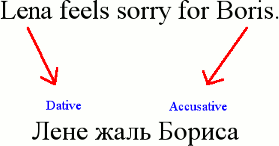Жаль (часть вторая)
The word жаль has several meanings, and today we will discuss its use in the sense of “to feel sorry for” a person. We English speakers have to do a grammatical backflip when dealing with the construction. In English the person who experiences the emotion is the subject of the verb, and the person pitied is the object of the preposition ‘for.’ In Russian the person who experiences the emotion appears in the dative case, and the person pitied appears in the accusative case:

Жаль sentences can be translated into English several ways:
| Лене жаль Бориса. | Lena feels sorry for Boris. or Lena feels bad for Boris. or Lena feels pity for Boris. |
| Мне жаль тебя. | I feel sorry for you. or I feel bad for you. or I feel pity for you. |
You will notice there is no verb in the sentences. To put them into the past tense, you add было; for the future, add будет:
| Лене было жаль Бориса | Lena felt sorry for Boris. or Lena felt bad for Boris. or Lena felt pity for Boris. |
| Лене будет жаль Бориса | Lena will feel sorry for Boris. or Lena will feel bad for Boris. or Lena will feel pity for Boris. |
Here you can see the phrase in more complicated sentences:
| Женя потерял ногу в Афганистане. Мне так жаль его, но не знаю, как я могу ему помочь. | Gene lost a leg in Afghanistan. I feel so sorry for him, but I don't know how I can help him. |
| На дворе стояла девочка, промокшая до костей от дождя. Бабушке было так жаль её, что она привела её в квартиру, переодела её в сухое платье, напоила горячим чаем и положила в постель. | There was a little girl standing out in the year, soaked to the skin from the rain. Grandma felt so sorry for her that she brought her into the apartment, put a dry dress on her, gave her hot tea to drink and then put her to bed. |
| Как ты можешь так со мной разговаривать? Разве тебе меня не жаль? | How can you say such things to me? Don't you feel sorry for me? |
| Вере было жаль Олега, потому что он никогда не испытывал родительскую ласку. | Vera felt sorry for Oleg because he had never experienced affection from his parents. |
4 comments
Paul Baxter, it is normal for Russian language, when the subject is missed out.
we don’t usually say “промокнуть до костей". it’s better to say “промокнуть до нитки".
and “никогда не испытывал родительскую ласку” sound not natural in Russian. I’d say “не знал родительской ласки".
“You will notice there is no verb in the sentences.”
I noticed that there is no grammatical subject either.
I’d also mentioned the colloquial form of this word - жалко. You’d rather hear жалко instead of жаль in natural speech, although in written language you will see жаль more often.
Form is loading...